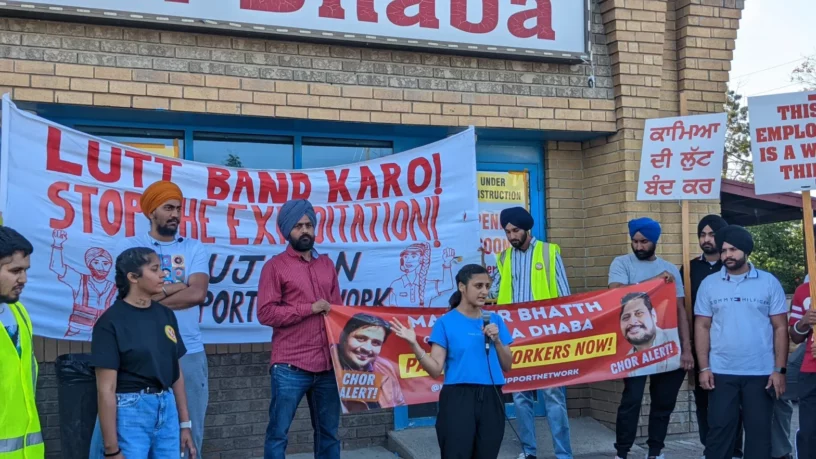Inspired by India’s recent farmer protests, immigrant truckers and students are bringing fresh militant tactics to their struggle for worker justice in the greater Toronto area. The results speak for themselves.
Arshdeep Singh, a 30-year-old Punjabi semi-truck driver in the Toronto suburb of Brampton, was left with a bloodied lip after his group’s protest on July 9 outside Sukh Auto, an auto repair shop. Singh was attacked by the shop owner, Sukhdeep Hunjan, and a handful of goons.
It was one of said goons who threw the punch that busted Singh’s mouth. Then Hunjan, a squat boss in a tan shirt, black pants, and blue sneakers, called the police—not to report the assault, but to report the protest.
The Peel Regional Police promptly sent 10 cop cars to the scene, but that didn’t stop the crowd of about 100 from chanting “Lutt band karo! (Stop the robbery!),” and other choice slogans.
Through campaigns reliant largely on direct action, NSN has managed to fight and win back over $200,000 CAD ($154,000 USD) in stolen wages for its members. The organization of about 100mostly Punjabi immigrant workers and students (“Naujawan”translates to “young people” in Punjabi) is a little over a year old.
This was the second protest outside Sukh Auto that Naujawan Support Network (NSN) had held in a matter of months. Both protests were designed to pressure Hunjan to pay back wages stolen from former employee Rupinder Singh by publicly naming and shaming the boss. (A note for readers: While a number of them share the last name Singh, none of the persons interviewed for this piece are related to one another.)
The sign for the shop is now gone—and, according to members of NSN, Hunjan has changed the name of his business on Google.
Bold, militant protests like these are happening with increased frequency in Brampton, resulting in big wins for workers who have been exploited and taken advantage of for too long. And yet, the Toronto-area group’s emergence as a powerful grassroots force fighting for worker justice has been among the least reported labor stories in North America’s settler colonies over the past year (with some very limited exceptions).
Through campaigns reliant largely on direct action, NSN has managed to fight and win back over $200,000 CAD ($154,000 USD) in stolen wages for its members. The organization of about 100 mostly Punjabi immigrant workers and students (“Naujawan” translates to “young people” in Punjabi) is a little over a year old.
At the core of NSN is a dedicated group of volunteers and workers who connect with and support other workers who have experienced wage theft or other forms of exploitation. Mobilizing workers and community members to take collective action, like the protests in front of Sukh Auto, is an integral part of the organization’s mission—and a crucial source of its strength.
“Our benchmark—our filter—for organizing is that a worker has to be willing to come to an organizing meeting and fight for their rights while standing alongside other workers,” Simran Dhunna, a 26-year-old NSN organizer, told TRNN.
Continue reading
